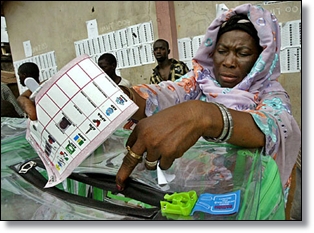2011 Elections: Will Nigeria Betray Africa?

 |
| Nigeria: A woman casts her vote Photo courtesy |
The 2011 election will mark the third time since 1999 that democratic national elections have been conducted in Nigeria. However, the 2003 and 2007 elections were not only controversial but also widely condemned by domestic and international election observers as being less than free and fair. In 2011, a less than free and fair election in Nigeria will be dangerous for a number of reasons.
Nigeria as known in many countries in North Africa has a significant, restive, largely unemployed youth population. Unemployment among university graduates is high in Nigeria and the use of Internet cafes is a popular preoccupation of disaffected youth. It is now known that the youth in North Africa relied almost exclusively on Internet and cell phone connections to get organized. Poverty rate is more than 50% in many parts of Nigeria, and even higher among the youth. Food prices remain exorbitant to the average Nigeria; wages have been stagnant and economic opportunities, elusive. The income gap between the elite and the poor is wide. Government services are spotty at best and perception of public service corruption is rife. All these aforementioned issues are operational in North Africa and fueling discontent with the status quo.
Nigeria has a chance in the next few weeks to create a firmer foundation for its democracy through a free and fair election. The Nigeria’s Independent Electoral Commission appears determined to slay the ghost of past flawed elections. The chairman of the election commission is a widely respected former university vice chancellor. Nearly 68 million Nigerians registered to vote, according to the election commission. More than 300 domestic election observer organizations have been accredited for the election. International observers are also welcomed by the election commission. Logistics and security measures are in place to safeguard votes and rapidly announce results, according to the election commission, thereby engendering greater public confidence in final vote tallies.
However, worrying signs remain despite stated efforts of the election commission. The electoral commission will rely on 360,000 temporary staff to implement various activities during the election. There is no evidence that these temporary workers will fare better than their processors regarding probity and transparency. In addition, politically motivated violence remains a problem, with reported killings and maiming of opposing political supporters in different parts of the country. Security and sanctity of election results remain major issues in far flung polling places and distant outposts.
The 2011 April election is a potential game changer regarding the future aspirations of Nigeria. As a country that comprises nearly one fifth of the Sub-Sahara population and 47% of West Africa’s population, Nigeria deserves leadership at all levels of its government legitimately elected in a free and fair election. To assume its natural role of leadership in Africa, among South-South nations and within the international community, Nigeria must continue to deepen its democratic roots, with transparent elections as the barest minimum.
By Dr. Chinua Akukwe
The author is a former Chair of the Technical Board of the Africa Center for Health and Human Security at the George Washington University, Washington, DC. He can reached at [email protected]
